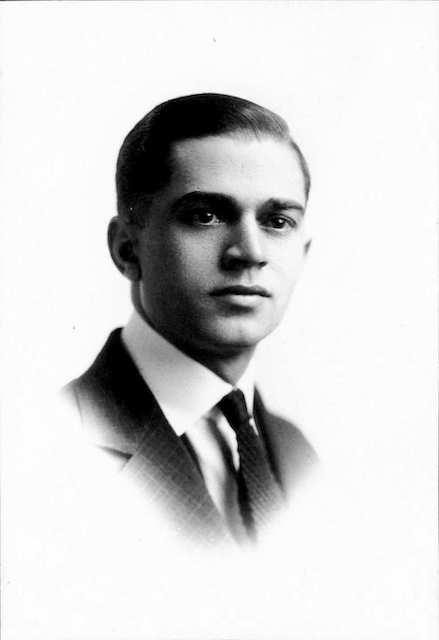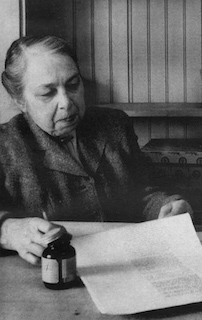

Fred Ferguson, circa 1922-23, and Bess Ferguson, pictured in the March 1962 issue of The Iowa Homemaker, Vol. 41, No. 8. Photos courtesy of Bess and Fred E. Ferguson Papers, Iowa State University Library Special Collections and University Archives
March/April 2024 (Volume 16, Issue 2)
By Samuel Poage
During the depths of the Great Depression in the early 1930s when high unemployment, poverty and declining farm incomes were commonplace across the nation, a married couple from Iowa worked to help poor Americans feed and clothe their families by sharing their knowledge of agriculture and household economics through a series of articles that they wrote for national publications.
Iowa natives Fred and Bess Ferguson, graduates and employees of Iowa State College, tested and shared their scientific findings with readers to help them live cost-effectively for decades, most notably during the Great Depression which was sparked by the Wall Street Crash of 1929. The two met while working together on the Iowa Agriculturist at Iowa State College during the early 1920s. Though their work was in the public eye, the story of their lives and careers for the most part has been tucked away in the Special Collections and University Archives of their alma mater, Iowa State University.
Fred’s interest in agriculture started at a young age. Fred Elmo Ferguson was born on a farm near Laurens in Pocahontas County on April 16, 1898, the son of Franklin and Lizzie (Rush) Ferguson. Alongside his parents and two brothers, Roland and Lloyd, he grew up working on his family’s farm.
In 1912, Fred demonstrated an early interest in horticulture when he compiled a collection of plants and herbs and put them in an herbarium, according to The Ferguson Papers which are housed in the Special Collections Department, Parks Library at Iowa State University in Ames. In high school, Fred was active in the Declamatory Club that toured Iowa, which improved his speaking skills and would serve him well in the future. Traveling across the state also exposed him to various agricultural landscapes in Iowa furthering his interest in agronomy.
In 1915, Fred graduated from high school and enrolled at Iowa State College in the fall studying journalism and agricultural science. Fred participated in extracurricular activities in college, winning first place in the Iowa Corn Contest his freshman year and later winning first place in a pig growing contest, according to The Ferguson Papers. He was elected business manager of Sigma Delta Chi, a journalism fraternity.
Fred received his bachelor’s of science degree from Iowa State College in 1922 in animal husbandry and journalism. After graduation, he worked as a field secretary from 1922 to 1924 for the Iowa State Dairy Association before joining the staff at Iowa State as a publications editor (1924-1953) for Iowa State and the Iowa Agriculture and Home Economics Experiment Station, a program established in 1888 to develop research projects to advance practical science for citizens.
At the beginning of his career, Fred helped found the Jersey Cow Group, a group of farmers dedicated to studying and breeding Jersey Cows. Fred wrote his first article in 1923 for The Orange Judd titled, “Gather to Talk Farm Problems,” according to the Des Moines Register. Later that year, Fred and Bess were married on Nov. 10, 1923, in Des Moines.
Elizabeth “Bess” (Storm) Ferguson was born on July 8, 1897, near Nevada, to parents Jeremiah and Anna Frances Storm. In 1916, while attending Adel High School, she was the editor for the Adelphic Literary Society and the Lyric Club. By participating in extracurricular clubs during her adolescence she gained valuable experience that would help shape her writing style and expose her to different forms of written media that she would later encounter. She graduated that same year and enrolled at Iowa State College to study journalism and home economics.
When Bess began to study home economics, she was unaware that the field was about to enter a golden age. According to “The History of Home Economics” by home economist Hazel T. Craig, 1915 was a “banner year” for the subject. Additionally, Iowa State’s home economics department was booming by 1912 and by the time that Bess began attending classes in the fall of 1916, the department had been growing in attendance and prestige. While at college she was a member of Gamma Phi Beta, a prominent women’s sorority known for networking and helping women to become active in the work force.
Bess received her bachelor’s of science degree in home economics and journalism from Iowa State College in 1921. She studied journalism, English, sociology and psychology and was a member of several student publications including the I.S.C. Student and the Iowa Agriculturist. She also founded and was the first editor of Iowa State’s The Iowa Homemaker, a magazine dedicated to home economics majors, according to The Ferguson Papers. After college she edited several journals, co-authored several books (including “A Century of Home Economics at Iowa State University”) and was an instructor from 1969 to 1971 at Iowa State’s Department of Journalism and Mass Communication. Bess was also a regular guest on WOI Radio AM/FM during Martha Duncan’s “Homemaker’s Half-Hour” and appeared on WOI-TV’s “Sixty-Plus.”
TO READ THE ENTIRE STORY AND OTHER FASCINATING STORIES ABOUT IOWA HISTORY, subscribe to Iowa History Journal.
